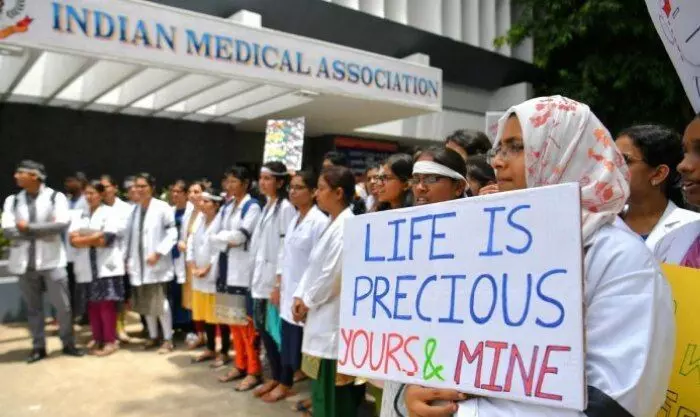Am I next?: What can be done to protect medicos amidst rising violence
A medico doctor narrated an incident when a patient was brought dead to an emergency room. A group of people came along with the patient and attacked the doctor, blaming him for negligence
By Sri Lakshmi Muttevi
Hyderabad: A day after 22-year-old house surgeon Dr Vandana Das was stabbed to death by a patient at Kottarakkara in Kerala, a nephrology resident, Dr Rahul, was beaten up by a patient’s attendants in NIMS, Hyderabad.
While such attacks on doctors are increasing in the country, medicos working in hospitals now worry that they might be the next victim.
There have been many incidents of patients or their attendants attacking doctors in hospitals, blaming them for negligence in treating patients. In a few cases, patients tried to attack doctors under the influence of alcohol or drugs.
Medicos nationwide are condemning such attacks and protesting for a safe work environment.
According to research by the Indian Medical Association, over 75% of physicians report having experienced abuse of some kind at some time in their careers. More than 60% of doctors reported finding themselves unable to treat patients without fear of violence.
‘We are blamed’
“Generally, house surgeons/PGs are the primary contacts of any patient in emergencies (casualty, ICU, NICU, labour room). In my tenure as a president of the Junior Doctor Association (JUDA) in KGH, Visakhapatnam, I have seen many cases where my colleagues were attacked, and we have filed cases also. In 2022, a forensic PG was attacked with sharp objects by a patient’s attendants in AMC,” said Deep Chand, a doctor at Srikakulam Government College.
Deep Chand narrated an incident when a patient was brought dead to an emergency room. A group of people came along with the patient and attacked the doctor, blaming him for negligence.
Drunk attackers
According to a medico working at Andhra Medical College, in most cases, patient attendants are under the influence of alcohol. “Most of them come from low-economic backgrounds, and they are always drunk. When situations go out of hand and the patient is either suggested to go back home or they die, the attendants start blaming us, attack us, and destroy hospital property,” said another medico Swathi (name changed).
Changes need to be brought about
“This problem requires a forceful response. Now is a good moment to look at what can be done to completely eradicate this threat from our system, given the recent news stories of violent attacks against healthcare providers. We think the law should include severe penalties as a primary deterrent, but there are alternative approaches that should be used to prevent rather than punish,” said a healthcare worker.
Violence hotspots
“Hospitals are known to be violent hotspots due to the nature of the diseases treated there. The presence of alcohol increases the risk of violence, as seen in the current incident. Violence in real-life settings is fast, furious, and unpredictable, and tragic outcomes can occur within a few seconds. Preventive measures like crowd control and triaging can help, but strong legislation is needed to discourage such incidents on a wider scale,” said Dr Rajeev Jayadevan, former president of IMA Cochin.
Need better security
“When it comes to government colleges, there is a scarcity of security staff in every department/ward. Patients might, at times, visit a government hospital in critical condition after receiving treatment at a private hospital. When the person dies in a fit of rage, they shout at us. They are not in a situation to understand the facts,” said Priyanka, a medico at a government college.
“We should have better protection in emergency and sensitive places in the hospitals. An emergency siren can be set up so that everyone can gather within no time,” added the medico.
Awareness and education in gyneac wards
“On a daily basis, we get to see many pregnant women admitted with complicated cases. Babies born with health issues need to be observed. During this time, the attendants of the mother/baby need to be educated about their health conditions. There are cases when attendants start shouting at us for the death of the baby,” said a medico student from Tirupati Government Maternity Hospital.
Things required to create a friendly environment
· Briefing of patients and relatives: Patients and workers should be informed of their duties, liabilities, and potential adverse effects and forced to sign particular commitments.
· Visual reminders: Posters and brief TV films aired within the facility can be used to prominently showcase them.
· Family counselling for adverse events: No matter where it is used, training for counselling families in dealing with traumatic events and preparing them to receive bad news has proved successful.
· Personnel readiness: Each employee should get training on how to recognise potentially dangerous circumstances that put them at risk, what to do to protect their safety and the safety of their coworkers, how to get help, and de-escalation techniques. Emergency siren in the ward so that everyone can gather within no time during any incidents.
· Visible security infrastructure: CCTVs, alarms, and trained security staff with established management protocols may all be quite helpful in limiting potentially dangerous situations.
Inputs by-
Anoushka Caroline Williams